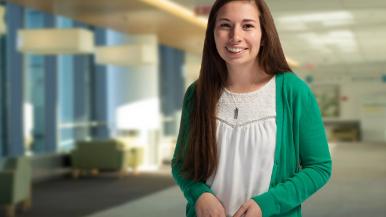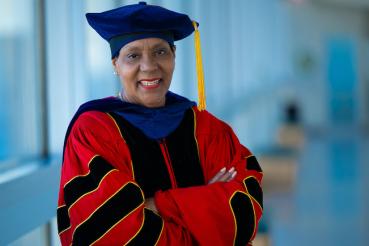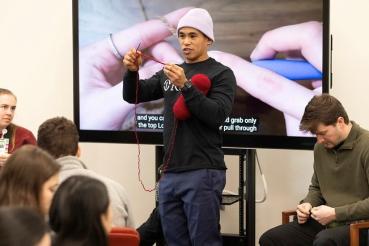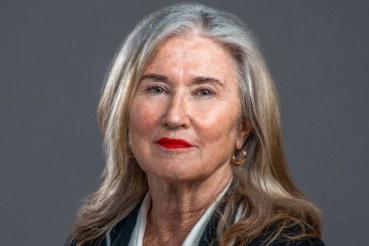All of the stores in Kirsten Petrarca’s sleepy hometown in Rhode Island closed early every day. Her dream of becoming an audiologist, though, never shut down.
By 15 years old, Petrarca was learning sign language for fun with her friends and already had her mind set on becoming an audiologist. Now she’s well on her way to achieving her career goals and is enjoying all of the perks of living in a much larger city, including the volunteer opportunities, as a third-year audiology student at Rush University.
Tell us about your background.
Kirsten Petrarca: I grew up in Tiverton, which is a super small town in Rhode Island. After graduating from high school in 2014, I went to Loyola University in Baltimore for my bachelor’s degree in speech-language pathology/audiology. I 100% knew I wanted to go into audiology, and I was very vocal about it! My classmates would make fun of me and say, “OK, already, we all know!”
One of my professors was an audiologist at the Maryland School for the Blind, and we would help her with hearing screenings there sometimes. I’ve never had a bad day in audiology. It’s always been fun. Always. I constantly want to learn more and observe more.
So it seems you were pretty set on audiology very early on.
KP: Yeah, I decided I wanted to do audiology as a sophomore in high school, when I was 15. When I was growing up, I saw my mom work as a first grade teacher, so I thought I wanted to be a teacher like her. As I got older I moved away from that.
In high school, my friends and I started teaching ourselves sign language, which led to an opportunity to meet the director of the Rhode Island School for the Deaf. She told me that if I want to work with this population, there are two sides of it: the education side — you can be a teacher of people who are deaf — or the medical side, which is audiology. At this point I already knew I didn't want to be a teacher anymore. She told me all about audiology, what audiologists do and how they work in schools and hospitals and everywhere you can possibly think of. I was blown away.
I observed a local audiologist for my senior research assignment and got to see her working with patients. I learned about a typical day in the field and the different niches within the field, and that only solidified everything for me.
What sparked your interest in sign language at 15 years old?
KP: My friend was a language genius. We were in a Spanish class together, and she was already fluent. Over the summer, we got bored — as 15-year-olds do — and started teaching ourselves sign language. We learned random stuff in a bunch of different languages, and one of them was American Sign Language. For us, it was a challenge and just something really fun to do.
Why did you choose Rush to help you reach your goal?
KP: One of my friends from undergrad, who is a couple years ahead of me, is also in the audiology program at Rush. I thought, ‘If she loved Loyola as much as I did, then Rush must be amazing too.”
Chicago was so far from home, so I remember being pretty nervous about the decision. When I was looking at programs, my biggest concern was finding a place that is going to feel the most like home. I remember eating lunch with my parents during a visit to Rush and saying, “This is it.” I felt like I was at home. All of the faculty sounded so excited about everything, and they were so welcoming and told me about all of the initiatives at Rush. I was just so enamored.
Now that you have been here for a while, how are you feeling about attending Rush and living in Chicago — one of the biggest cities in the world — after growing up in a small town?
KP: Yeah, my hometown is definitely more on the small side. Everything closed early. I was nervous about moving to Chicago. I mean, I did live in Baltimore for my undergrad education, but it’s not nearly as big as Chicago. It was an adjustment, but it helped to have a friend here already, as well as great mentors at Rush. And people from my hometown told me they had been to Chicago before and raved about how much there is to do and see there.
My experience so far has been amazing. The faculty are so supportive. The curriculum is challenging, but they make sure you know your stuff. I love that everything is clinically focused. But my favorite thing has been being elected as co-philanthropy chair of our student Academy of Audiology group. Working in that role and all the different community initiatives we have within Rush has probably been my favorite part of being here.
What are some fulfilling activities you’re working on?
KP: I’m helping coordinate volunteer activities for other audiology students, and I also volunteer myself. We participate in the Chicago Walk4Hearing, which is an annual fundraiser for the Hearing Loss Association of America. We also do hearing screenings in the community in collaboration with Rush Medical College. There is a lot of opportunity for us to help those who need hearing screenings, while also giving us a chance to advocate for our profession and work with other professionals. Also, Dr. McCarthy approached me about starting audiology services at a clinic that our medical, nursing and physician assistant students run at Franciscan House, which is a shelter on the West Side for people experiencing homelessness. That program as a whole is currently on hold due to COVID-19 restrictions. But we are eager to expand our involvement and provide support to that population as soon as we are able to.
What are your postgraduation career plans?
KP: I’ve definitely grown to love Chicago, but I want to go back to New England to start my career there. I know that I want to work with kids, which comes from seeing my mom work as a first grade teacher. I really want to work with school-aged kids and their families, their teachers, and any other therapists or professionals in the mix to make sure kids are supported and are developing as they should.
What advice would you give to your younger self or to someone who might be considering a similar career path?
KP: I know it sounds cliche, but I would tell people that everything really does happen for a reason. I look back at my experience as a kid getting to go to the Rhode Island School for the Deaf and learning about audiology and the fact that there was this one day when I was 15 when everything was just set in stone from then on out. Even my decision to attend Rush — I didn't expect to go to school here. I expected to stay on the East Coast, but things worked out really well.
So don't stress so much if things aren't going exactly according to plan. Pursue your big goals, but know that there's going to be so many different ways to achieve them. As long as it makes you happy, whatever route you take is the best way.




